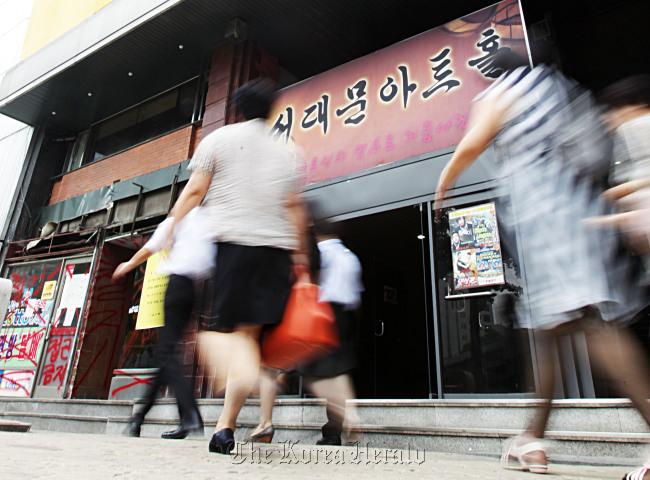The last one-screen cinema in Seoul plays classic finale
By Korea HeraldPublished : July 12, 2012 - 19:30
Seoul’s last old-style, one-screen cinema, soon to be knocked down and replaced by a hotel, played its final movie Wednesday ― the Italian classic “The Bicycle Thief’’ ― a moment so emotional for the theater operator that she publicly shaved her head in frustration.
The theater, which opened in 1964, had become a place where mostly elderly moviegoers gathered regularly to watch classic Hollywood and South Korean films and indulge in nostalgia for cinematic days gone by.
As huge multiplexes made it hard to compete financially, the Seodaemun Art Hall played up the one thing the newer theaters could never match ― its age. But the theater’s attempt to keep business alive based on that shared joy of nostalgia and a sense of community among its elderly patrons came to an end Wednesday.
The theater, which opened in 1964, had become a place where mostly elderly moviegoers gathered regularly to watch classic Hollywood and South Korean films and indulge in nostalgia for cinematic days gone by.
As huge multiplexes made it hard to compete financially, the Seodaemun Art Hall played up the one thing the newer theaters could never match ― its age. But the theater’s attempt to keep business alive based on that shared joy of nostalgia and a sense of community among its elderly patrons came to an end Wednesday.

“My heart is aching because I have to let (the theater) go like this,’’ Kim Eun-ju, 39, the head of theater operator Hollywood Classic, said before having her head shaved. “Working here was the happiest time of my life.’’
The building venerates Hollywood royalty, with a hand-painted advertising board over the theater and big photos of American movie stars like Audrey Hepburn and Elizabeth Taylor hanging on the walls. Still, it also has a distinctly South Korean feel: No popcorn is sold here; only rice cakes favored by many elderly Koreans.
This glorification of the past is increasingly hard to find in the hustle and bustle of ultramodern Seoul, where older neighborhoods disappear constantly, replaced with construction sites throwing up gleaming glass and steel buildings housing apartments, hotels and offices.
Seoul officials approved plans to demolish the theater as early as August to build a high-rise hotel, hoping to create jobs and resolve a shortage of hotel rooms for foreign tourists. Seoul-based Glotel, the landlord of the theater building, declined to comment.
The theater’s end has been hard to take for many of the workers and people who regularly watched movies here, hundreds of whom came Wednesday to see Italian director Vittorio De Sica’s 1948 classic. Most were in their 60s to 80s, and many expressed sadness.
“Old people have fewer places to go now,’’ said Kim Ki-woong, a 70-year-old Seoul resident who visited the theater twice a week. He stood beneath the theater’s billboard, which, instead of the usual hand-painted movie pictures, had a sign that read, “Please protect the culture of senior citizens.’’ (AP)
-
Articles by Korea Herald







![[Graphic News] More Koreans say they plan long-distance trips this year](http://res.heraldm.com/phpwas/restmb_idxmake.php?idx=644&simg=/content/image/2024/04/17/20240417050828_0.gif&u=)
![[KH Explains] Hyundai's full hybrid edge to pay off amid slow transition to pure EVs](http://res.heraldm.com/phpwas/restmb_idxmake.php?idx=644&simg=/content/image/2024/04/18/20240418050645_0.jpg&u=20240419100350)






![[From the Scene] Monks, Buddhists hail return of remains of Buddhas](http://res.heraldm.com/phpwas/restmb_idxmake.php?idx=652&simg=/content/image/2024/04/19/20240419050617_0.jpg&u=20240419175937)

![[KH Explains] Hyundai's full hybrid edge to pay off amid slow transition to pure EVs](http://res.heraldm.com/phpwas/restmb_idxmake.php?idx=652&simg=/content/image/2024/04/18/20240418050645_0.jpg&u=20240419100350)

![[Today’s K-pop] Illit drops debut single remix](http://res.heraldm.com/phpwas/restmb_idxmake.php?idx=642&simg=/content/image/2024/04/19/20240419050612_0.jpg&u=)